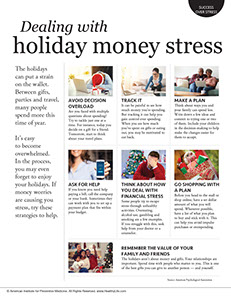SYMPTOM CHECKER
CONDITIONS
Male
Female
Child
Arm, Hand & Shoulder Concerns
Legs & Feet Concerns
Dental & Mouth Concerns
Ear & Nose
Eye Conditions
Head Conditions
Arm, Hand & Shoulder Concerns
Legs & Feet Concerns
Front
Back
Arm, Hand & Shoulder Concerns
Dental & Mouth Concerns
Ear & Nose
Eye Conditions
Head Conditions
Arm, Hand & Shoulder Concerns
Dental & Mouth Concerns
Ear & Nose
Eye Conditions
Head Conditions
Front
Back
Arm, Hand & Shoulder Concerns
Neck Links
Head & Neck Concerns
Arm, Hand & Shoulder Concerns
Neck Links
Head & Neck Concerns
Front
Back
Online Clinic
Wise Healthcare
Dealing with holiday money stress
Print on Demand
The holidays can put a strain on the wallet. Between gifts, parties and travel, many people spend more this time of year.
It’s easy to become overwhelmed. In the process, you may even forget to enjoy your holidays. If money worries are causing you stress, try these strategies to help.
• Avoid decision overload: Are you faced with multiple questions about spending? Try to tackle just one at a time. For instance, today you decide on a gift for a friend. Tomorrow, start to think about your travel plans.
• Track it: It can be painful to see how much money you’re spending. But tracking it can help you gain control over spending. When you see how much you’ve spent on gifts or eating out, you may be motivated to cut back.
• Make a plan: Think about ways you and your family can spend less. Write down a few ideas and commit to trying one or two of them. Include your children in the decision-making to help make the changes easier for them to accept.
• Ask for help: If you know you need help paying a bill, call the company or your bank. Sometimes they can work with you to set up a payment plan that fits within your budget.
• Think about how you deal with financial stress: Some people try to escape stress through unhealthy activities. Overeating, alcohol use, gambling and smoking are a few examples. If you struggle with this, seek help from your doctor or a counselor.
• Go shopping with a plan: Before you head to the mall or shop online, have a set dollar amount of what you will spend. Whenever possible, have a list of what you plan to buy and stick with it. This can help you avoid impulse purchases or overspending.
• Remember the value of your family and friends: The holidays aren’t about money and gifts. Your relationships are important. Spend time with people who matter to you. This is one of the best gifts you can give to another person — and yourself.
Source: American Psychological Association
This website is not meant to substitute for expert medical advice or treatment. Follow your doctor’s or health care provider’s advice if it differs from what is given in this guide.
The American Institute for Preventive Medicine (AIPM) is not responsible for the availability or content of external sites, nor does AIPM endorse them. Also, it is the responsibility of the user to examine the copyright and licensing restrictions of external pages and to secure all necessary permission.
The content on this website is proprietary. You may not modify, copy, reproduce, republish, upload, post, transmit, or distribute, in any manner, the material on the website without the written permission of AIPM.
2021 © American Institute for Preventive Medicine - All Rights Reserved. Disclaimer | www.HealthyLife.com
















































